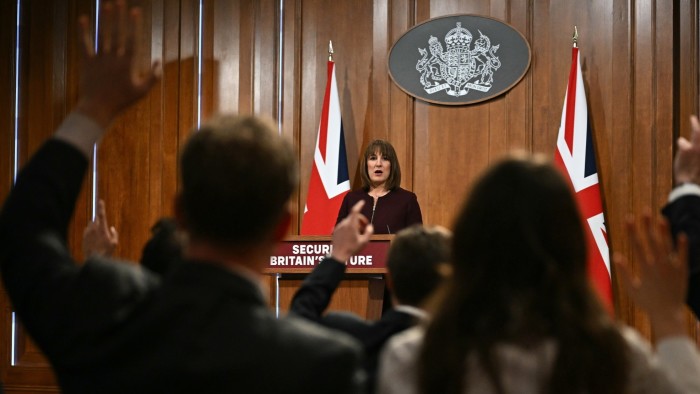Chancellor Rachel Reeves’ theme was “security”. But as the dust settled on her Spring Statement, with its almost £5bn of welfare cuts, the mood among Labour MPs and in the country was one of mounting uncertainty about what lies ahead.
“There has been a lot of fear out there,” said Dame Meg Hillier, Labour chair of the Commons public accounts committee, as MPs digested Reeves’ package of cuts and the government’s own estimate that it would force 250,000 people, including 50,000 children, into relative poverty.
“Balancing the books on the backs of the poor,” was the front page verdict of both the left-leaning Guardian and Daily Mirror. Across the board, Reeves’ statement received a media panning, with many focusing on the fact her fiscal plans are fragile and may soon need rebuilding with tax rises.
The coming months will be crucial economically and politically for Reeves. Selling welfare cuts to Labour MPs will be tough enough; having to explain to the country why she is having to raise taxes again, following a £40bn rise last October, would add to her problems.
Reeves’ team is adamant that the chancellor has done the right thing in tackling Britain’s spiralling sickness and disability bill. “Brushing it under the carpet isn’t an option,” said one ally. “We will deal with the politics.”
Most Labour MPs accept that the welfare bill must be brought under control — and the Conservatives say they would go further. Indeed, the public seems to agree with the idea in principle.
A YouGov poll this month found that 68 per cent of Britons thought that the benefit system worked badly and needed reform, while 53 per cent believed the tests to receive benefits were not strict enough.
But that is in the abstract. The political problem arises when ministers — and local MPs — are confronted with individual cases, where a person with a disability or their carer fears that their life is about to upended.
Sir Keir Starmer, prime minister, argued that the government analysis suggesting 250,000 people would be pushed into relative poverty did not take account the government’s investment in helping people to find work.
The Joseph Rowntree Foundation has estimated that the rise in people in relative poverty would be at least 350,000. However big the rise, increasing poverty is a political weapon that can be deployed repeatedly against Labour.
The Liberal Democrats, for example, this week said that Labour looked set to cut the digital services tax paid by US tech companies, claiming it was “tantamount to robbing disabled people to appease Musk and Trump”.
“Everyone is very nervous,” admitted one newly elected Labour MP. Soon those nerves will be tested when Starmer and Reeves lead their party through the division lobbies to vote for the reforms.
One Labour strategist close to Starmer said: “There is a loud minority of MPs who have spoken out. The Parliamentary Labour party will support this. The new MPs are young, ambitious and loyal. They know we can’t shy away from the difficult things.”

Reeves points to positive economic data such as rising real wages, better than expected retail sales, and notes that her planning reforms are now projected to increase Britain’s growth rate. “The fundamentals of our economy are strong,” said an aide.
But Reeves acknowledges Britain is at the mercy of unpredictable factors — notably whether Donald Trump escalates his trade war next week.
Reeves’ Spring Statement may have cleared up the immediate fiscal shortfall of £14bn, but she has not dispelled the worries about her overall strategy.
By restoring the buffer against her current budget rule to £9.9bn — the exact amount she had exiting the October Budget — Reeves has left herself once again a prisoner of market movements, analysts warn.
The day after the Spring Statement, the chancellor was confronted by headlines showing that recent increases in borrowing costs would knock back the headroom to an estimated £6.5bn, according to Capital Economics, if her next Budget were being held now.
“The need to take remedial action was a consequence of leaving so little headroom in October’s Budget, and the new plans leave a similarly slim margin for error in 2029-2030,” said Andrew Goodwin at Oxford Economics.
This, he said, “is very risky in an uncertain world”, adding that he thought there was a high probability that the OBR would have to downgrade its economic outlook significantly at a future fiscal event, forcing an even bigger budgetary repair job.
The OBR has been criticised for sticking to overly optimistic productivity projections, even though it has over the past 10 years lowered its medium-term productivity growth assumption from 2.2 per cent to 1.25 per cent.
The watchdog in this week’s outlook spelled out clearly how devastating a downgrade to its trend productivity growth forecast would be.
If annual growth in output per hour worked stayed at its current rate of 0.3 per cent over the five-year forecast period, rather than recovering as the OBR expects, the current budget would end the decade in deficit by about 1.4 per cent of GDP, meaning Reeves would miss her fiscal target by £48bn.
Reeves may have spoken nine times about providing “security” during her 33-minute speech on Wednesday, but she and the country face anxious months ahead.




